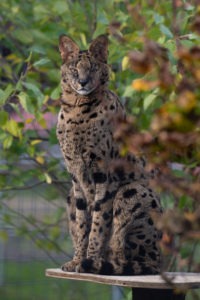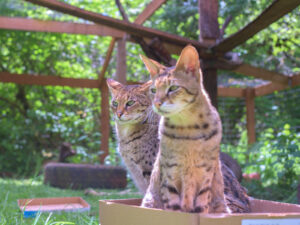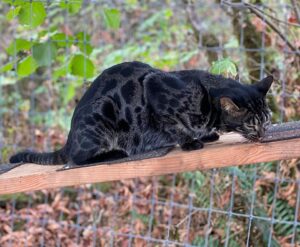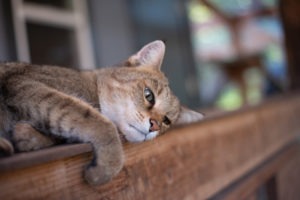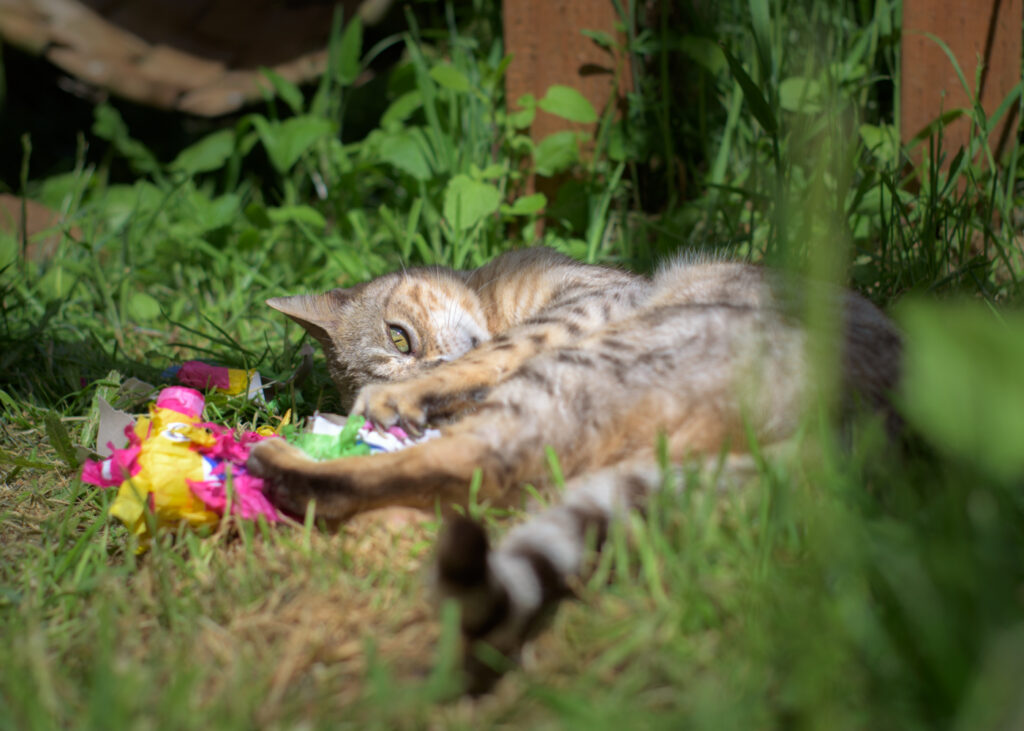New Arrivals: Lithuanian Savannah Cats Find Sanctuary in Oregon
A Journey Across Continents
Yesterday evening WildCat Ridge Sanctuary welcomed three very special new residents. Avataras, Bondas, and Bagira – our Lithuanian savannah cats – finally touched down on American soil after a long and tiring journey.
Avataras, F1 Male
Meet Our New Feline Friends
- Avataras: This handsome boy is an F2 savannah, meaning he’s a first-generation hybrid between a serval and a domestic cat. With his striking spotted coat and tall, elegant frame, Avataras is sure to turn heads
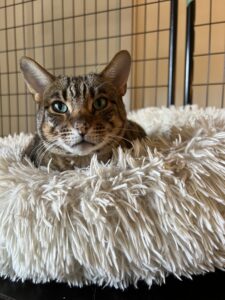
Bondas, F4 Male
- Bondas: An F4 male, Bondas is a fourth-generation savannah. While he may have a bit more domestic cat in his lineage, don’t let that fool you – he’s every bit as wild at heart as his F1 counterparts.
- Bagira: Another F2 savannah, this little female appears to be the most outgoing of our new trio.
The Journey Home
As their transport boxes were carefully unloaded, we could sense the cats’ eagerness to stretch their legs after their transcontinental trip. The soft mews and occasional chirps (a unique vocalization of savannah cats) told us they were more than ready to explore their new surroundings.
Settling In: The Quarantine Period
For the next 30 days, Avataras, Bondas, and Bagira will reside in our quarantine facilities. This crucial period allows us to:
- Closely monitor their health
- Ensure they’re eating well and adjusting to their new diet
- Give them time to acclimate to the sights, sounds, and smells of the sanctuary
- Conduct any necessary medical check-ups or treatments
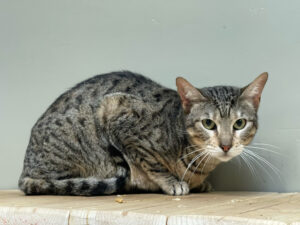
Bagira, F1 Female
We’re happy to report that all three cats have already shown healthy appetites, which is an excellent sign of their adjustment. Their curious nature is also evident as they cautiously but eagerly investigate every corner of their temporary homes.
Looking Ahead: New Friends and Forever Home
Once their quarantine period is complete, our Lithuanian trio will transition to a specially designed enclosure within the sanctuary. Here, they’ll have the opportunity to meet some of our other resident cats. Savannah cats are known for their social nature, so we’re excited to see the friendships that may develop.
The Importance of Sanctuary
The arrival of Avataras, Bondas, and Bagira highlights the ongoing need for sanctuaries like ours. While savannah cats are legal pets in many areas, their wild instincts and specific care requirements often lead to them being surrendered or abandoned. At WildCat Ridge Sanctuary, we’re committed to providing these magnificent creatures with the specialized care and enrichment they need to thrive.
How You Can Help
We’re thrilled to provide a forever home for Avataras, Bondas, and Bagira, but we can’t do it without your support. Here’s how you can help:
- Consider being the first to sponsor one of our new arrivals
- Donate to help cover the costs of their care
- Share this story to raise awareness about the challenges faced by hybrid wild cats
Stay tuned for more updates on our Lithuanian savannah cats as they settle into their new lives here at WildCat Ridge Sanctuary. We can’t wait to share their journey with you!
WildCat Ridge Sanctuary is a non-profit organization dedicated to providing a safe haven for abandoned, abused, and retired exotic cats. We believe that education is key to ending the exotic pet trade and are committed to sharing the stories of our residents to promote conservation and responsible animal care.
Recent Posts
-
January 25, 2025
-
December 28, 2024
-
December 22, 2024
-
October 16, 2024
-
October 8, 2024
Tags
Archives
- January 2025
- December 2024
- October 2024
- July 2023
- March 2023
- February 2023
- June 2022
- January 2022
- December 2021
- November 2021
- October 2021
- September 2021
- August 2021
- November 2020
- August 2020
- July 2020
- June 2020
- May 2020
- March 2020
- February 2020
- November 2019
- September 2019
- May 2019
- April 2019
- February 2019
- January 2019
- December 2018
- November 2018
- October 2018
- September 2018
- August 2018
- July 2018
- June 2018
- May 2018
- April 2018
- March 2018
- February 2018
- January 2018
- December 2017
- October 2017






